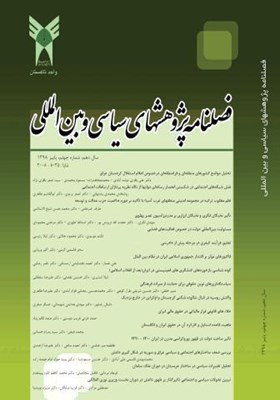تحلیل مواضع کشورهای منطقه ای و فرامنطقه ای درخصوص اعلام استقلال کردستان عراق
محورهای موضوعی : مجله پژوهش های سیاسی و بین المللی
کلید واژه: ایران, ترکیه, استقلال, سوریه, کُرد, کردستان عراق,
چکیده مقاله :
علی باقری دولت آبادی[1]- محمدمجاهدزاده [2]- مسعود محمدی[3] - سید اصغر باقری نژاد[4] تاریخ دریافت:1/7/1397- تاریخ پذیرش:10/8/1397 چکیده: یکی از موضوعات بحث برانگیز در داخل عراق و در سطح منطقه خاورمیانه، موضوع استقلال طلبی کردهای عراق است. اعلام یک طرفه این استقلال و برگزاری رفراندوم از سوی دولت اقلیم کردستان در سال 2017 منجر به مخالفت دولت مرکزی عراق و کشورهای همسایه گردید به نحوی که خیلی زود این اعلام استقلال با شکست مواجه شد. پژوهش حاضر قصد دارد ضمن توضیح مواضع کشورهای همسایه عراق درخصوص اعلام استقلال کردهای این کشور، به دلایل این مخالفت و نگرانی ها بپردازد. همچنین توضیح سیاست روسیه، اتحادیه اروپا، آمریکا و اسرائیل در قبال استقلال طلبی کردها از دیگر اهداف پژوهش حاضر خواهد بود. یافته های پژوهش نشان می دهد دغدغه های امنیتی و نگرانی نسبت به تمامیت ارضی کشورهای منطقه، مهمترین عامل مخالفت این دولت ها با تشکیل کردستان مستقل بوده است؛ این در حالی است که سایر بازیگران فرامنطقه ای کوشیده اند با اتخاذ مواضعی دوپهلو از این موضوع به عنوان ابزاری برای تامین منافع ملی خود سود جویند. روش تحقیق در این پژوهش از نوع تحلیلی- توصیفی است و منابع به شیوه کتابخانه ای گرداوری شده است. [1]- دانشیار و عضو هیئت علمی،گروه علوم سیاسی، دانشکده زبان و ادبیات فارسی، دانشگاه یاسوج ،کهکیلویه و بویر احمد، ایران: نویسنده مسئول ab.dolatabadi@gmail.com [2]- دانش آموخته کارشناسی ارشد، روابط بین الملل، گروه حقوق و علوم سیاسی، دانشکده حقوق و علوم سیاسی، دانشگاه یزد، یزد، ایران mohammad.mojahedzadeh@gmail.com [3] - دانش آموخته کارشناسی ارشد، مطالعات منطقه ای، گروه حقوق و علوم سیاسی،دانشکده حقوق و علوم سیاسی، دانشگاه یزد، یزد، ایران [4] - دانش آموخته کارشناسی ارشد،علوم سیاسی، گروه حقوق و علوم سیاسی،دانشکده حقوق و علوم سیاسی، دانشگاه یزد، یزد، ایران
Dr. Ali Bagheri Dolatabadi[1] Mohammad Mojahedzadeh[2], Masoud Mohamadi[3] Seyed Asghar Bagherinejad[4] Abstract One of the most controversial issues within Iraq and throughout the Middle East is the issue of Iraqi Kurds' independence. The unilateral declaration of independence and the referendum by the KRG in 2017 led to opposition from the Iraqi Administration and neighboring countries, that way the declaration of independence was soon rejected. The present study intends to explain the views of Iraq's neighbors regarding the declaration of independence of the Kurds of Iraq, also the reasons of this opposition and their concerns. Explaining the policies of Russia, the European Union, the United States and Israel towards the independence of the Kurds will also be among the aims of the present study. The findings show that security concerns about the territorial integrity of the region have been the main cause of opposition by these states to the formation of an independent Kurdistan, while other transnational actors have sought to adopt ambiguous positions and take advantage of this issue as a means of securing their national interest. The method of research in this research is analytical-descriptive and the resources are collected in library method. [1] - Associate Professor, Department of Political Science, Faculty of Humanities, Yasuj University, Kohkiloyeh & Boyer Ahmad, Iran. (Correspond Author), abagheri@yu.ac.ir [2] - M.Sc., International Relations, Department of Law and Political Science, Faculty of Law and Political Science, Yazd University, Yazd, Iran. [3] - M.Sc., Regional Studies, Department of Law and Political Science, Faculty of Law and Political Science, Yazd University, Yazd, Iran. [4] - M.Sc., Political Science, Department of Law and Political Science, Faculty of Law and Political Science, Yazd University, Yazd, Iran.
_||_

